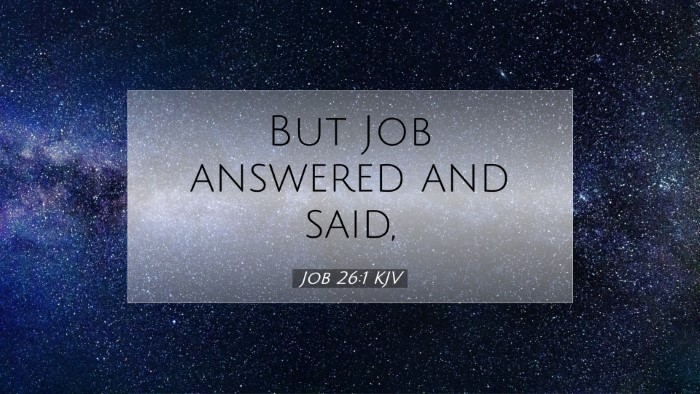Old Testament
Genesis Exodus Leviticus Numbers Deuteronomy Joshua Judges Ruth 1 Samuel 2 Samuel 1 Kings 2 Kings 1 Chronicles 2 Chronicles Ezra Nehemiah Esther Job Psalms Proverbs Ecclesiastes Song of Solomon Isaiah Jeremiah Lamentations Ezekiel Daniel Hosea Joel Amos Obadiah Jonah Micah Nahum Habakkuk Zephaniah Haggai Zechariah MalachiJob 26:1
Job 26:1 KJV
But Job answered and said,
Job 26:1 Bible Commentary
Commentary on Job 26:1
Job 26:1 (KJV): "But Job answered and said,"
The dialogue in the Book of Job takes a turn with Job’s response in this chapter. After enduring substantial suffering and the harangues of his friends, Job takes the opportunity to assert his own perspective on the situation and highlights profound themes that relate to God’s power and wisdom.
Contextual Analysis
This verse serves as the preamble to Job's powerful discourse, where he begins to speak about the majesty of God. It is essential to grasp the flow of the dialogue in the Book of Job. After a long series of accusations hurled at him by his friends, Job responds, showcasing not just his personal plight but also a greater theodicy the text explores.
Insights from Matthew Henry
Henry's Overview: Matthew Henry emphasizes Job's acknowledgment of the incomprehensible nature of God's greatness. Job's response reflects his deep understanding of the Almighty's authority over creation and His ability to govern the universe.
Henry points out that Job is not merely defending himself against the accusations, but he is almost provocatively contrasting the wisdom of God with the folly of his friends’ assertions. Job's dialogues highlight the limits of human understanding in the face of divine majesty.
Insights from Albert Barnes
Barnes' Interpretation: Albert Barnes provides a detailed look at Job's rhetoric in chapter 26. He notes that Job transitions from recounting his sufferings to articulating the grandeur of God’s creation. In this, Job capitalizes on a striking juxtaposition: if God indeed administers such vast and intricate creation, how could He be failing in administering justice in Job's own life?
Barnes elaborates on Job’s mention of the “dimensions” of God's power, suggesting a cosmic perspective from which Job views his suffering—as something small in contrast to the overarching grandeur of the divine purpose. This theme not only calls attention to God’s providence but also serves as a somber reminder of the limited human perspective amidst divine sovereignty.
Insights from Adam Clarke
Clarke's Exegesis: Adam Clarke delves into the poetic nature of Job’s speech, asserting that in verses following Job 26:1, he begins to explore the depths of divine knowledge and the majesty of God’s power. Clarke highlights the significance of Job asserting his awareness of the unseen world—the terror of the grave, and the marvels of creation—allude to God's unfathomable wisdom.
Clarke observes that Job is here demonstrating that true knowledge of God surpasses mere theological assertions. For Job, knowing God is intrinsically tied to experiencing His presence and understanding His cosmic governance.
Thematic Analysis
-
The Majesty of God:
Job’s reflections on God’s power encapsulate a broader biblical theme: the ineffable greatness of the Creator. This serves as a theological foundation for understanding human suffering—God is not just a distant observer but is intricately involved in the workings of creation.
-
The Limits of Human Understanding:
The philosophical implications here are profound; Job’s narrative illustrates the limits of human knowledge compared to divine wisdom, raising essential questions about the nature of God and His justice.
-
Rhetoric as Defiance:
Job's response not only serves as a defense but as a bold assertion of faith amid despair, emphasizing that questioning God is permissible when it seeks a deeper understanding of His character and purposes.
Conclusion
In Job 26:1, Job’s response is not merely an answer; it launches a profound meditation on the divine that invites readers—pastors, students, theologians, and scholars—to wrestle with the questions of divine justice, the complexities of human suffering, and ultimately, the magnificence of God’s creation and governance over all things.
This commentary on Job 26:1 highlights the rich tapestry of theological and existential questions that arise from suffering, underscoring the essential truth that even in anguish, one can find a true reflection of God’s majesty and purpose.


